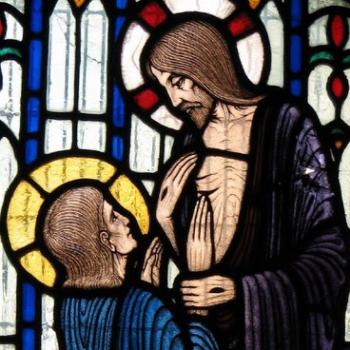Progressive Christians take that divine mission as a mandate to transform the world. Queerly progressive Christians take that same mission as a mandate to transform both the world and the Church as the latter has too often blocked the former for the sake of its own institutional survival. That mission of transformation will certainly lead a progressive Christian to weave the full range of social justice concerns into a seamless garment rather than treating each of those concerns as an isolated "issue." But a queerly progressive Christian goes further by turning to embodiment as the continuous thread in that garment. A thoroughly embodied theology of course evokes the classic Christian claim of Incarnation, which resists any dichotomous division between body and soul, or human and divine, or earth and heaven. Rather than an "escape hatch" from the material world, Christian faith bears witness to the God who continually creates it, redeems it, and sustains it. I like to refer to such witness as the practice of a "material spirituality."
Incarnation thus becomes the theological conviction that renders political questions a matter of profound Christian concern. Adopting a material spirituality, for example, will lead Christians to confront the cultural regulation of bodies, whether in immigration policy, access to health care, the constructions of race and ethnicity, stratifications of economic status, and the classification of sexuality and gender. Not just human bodies fall into this regulatory regime, but non-human animals as well, and the planetary "body" itself upon which all of this life depends.
Queerly progressive Christians, moreover, will rely on theology not only as the rationale for social and political engagement but also for fresh visions of where those engagements might lead. The ongoing battle over same-sex marriage offers a particularly apt illustration. The conflation of a civil contract with a religious rite in the midst of a contentious social justice movement has all but paralyzed Christian witness to the Gospel. In a time of economic insecurity and social instability surely the Church can offer more than either clichéd notions of "gender complementarity" or rusty slogans about civil rights.
British theologian Elizabeth Stuart agrees and notes that both sides of the marriage equality debate have betrayed historical Christian insights about the meaning of marriage. Both sides, she argues, have acquiesced to the modern Western view of marriage as an end in itself, if not the pinnacle of human fulfillment. Centuries of Christian tradition, stretching from the image of wedding banquets in the parables of Jesus through Dante's Divine Comedy, invite a rather different view: marriage points beyond itself to the Christian hope for union with God.
That "traditional" Christian view of marriage does not fit very comfortably in either the liberal or the conservative camp; indeed, I rarely hear it spoken at all. If it were, I imagine more than a few people would be startled by a traditional view that sounds fresh. They might hear in that view a compelling voice speak a bit more faithfully to what the Christian hope for love entails - not only for those who want to get married or who remain unmarried or whose marriages have failed but for anyone who has ever pondered humanity's journey with God.
A progressive Christian might worry about interrupting social policy debates with such overt theologizing. A queerly progressive Christian, however, believes that's exactly what the Church is for—to bear transformative witness to faith, to hope, and especially to love (1 Corinthians 13:13).
Jay Emerson Johnson is an Episcopal priest and a member of the core doctoral faculty at the Graduate Theological Union in Berkeley, California. He also serves on the staff of the Center for Lesbian and Gay Studies in Religion and Ministry at Pacific School of Religion. His first book is Dancing with God: Anglican Christianity and the Practice of Hope. He has also co-edited a two-volume anthology, Queer Religion, scheduled for publication later this year. Find him on Facebook, follow him on Twitter (@RevDocJay), and read his blog at www.queerlychristian.com.




